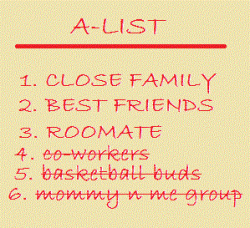Explaining Your Mental Illness to Others

A Step by Step Guide to Explaining Mental Illness
Explaining your mental illness to friends and family is one of the hardest tasks to face when you're newly diagnosed. Embarrassment over your illness, not knowing the facts, and being in a rush can all lead to quick, misinformed explanations that leave more questions then answers. This guide is designed to not only simplify the process, but also to let both you and your loved ones walk away still feeling comfortable with each other.
mental illness
n. Any of various conditions characterized by impairment of an individual's normal cognitive, emotional, or behavioral functioning, and caused by social, psychological, biochemical, genetic, or other factors.
Answers.com

Who's on your A-list?
Figuring out who should know
You don't need to tell everyone. It's best to start slow. Just plan on telling your closest friends and immediate family. And if you have a roommate, they should probably be included. Your coworkers, basketball buddies, and Mommy-n-Me group can wait til later.
My Story
After my husband, John, and I moved to his hometown, I realized I was going to have to tell a few people about having borderline personality disorder. My A-list included his mom, dad, sister, and two of his best friends.

Know Your Facts
You can't explain what you don't know.
Every mental illness has myths attached to it. Everyone knows a bipolar is eventually going to explode and kill someone. And someone with depression actually just feels sorry for himself. And a borderline? Well, we're all just faking it.
It's up to us to debunk these myths. The only way to do that is to know your facts. Check out your local library for books relevant to your illness. Call your local hospital and doctor offices to ask for any pamphlets or fact sheets they might have. And of course, use the web. There's hundreds (more likely thousands) of websites with useful information on them. Just remember, there's no such thing as too much information.
My Story
For 3 years after being diagnosed I had no idea what BPD was. I told people the same thing I was told, "Oh, I just have problems making the correct decisions.". I was soooo wrong. The first time I actually read something about BPD, I cried. Every symptom rang true. It's like it brought my life into focus. I no longer questioned why I am the way I am.

Useful Materials
I would recommend getting a book to keep with you. A beginners guide to your mental illness would probably be best. I would also recommend getting a 'How to cope' book for anyone you live with or spend a lot of time with. For anyone else, an information pamphlet or fact sheet should work.
Handing out reference material isn't necessary, but it helps a lot. A book can answer the questions you can't. And later on it can serve as a reminder to them to be patient with you.
Books for you
Getting a book to help you understand your mental illness can be important. The more you know about your mental condition, the empowered you will be.
These are just a couple of books Amazon has to offer.
Books to help your loved ones
If you live with someone, it might be helpful to get them a book about coping with a loved one who has your mental illness. A good book to choose is one that has plenty of information about your illness, but focuses more on coping mechanisms for your loved ones.
My Story
I had a very hard time getting materials on BPD. I couldn't afford books for everyone. My printer was broke, so internet articles were useless. And the only two places that mailed out BPD info said I lived to far away. I ended up designing my own BPD info pamphlet and an online printshop gave me a great deal to print them up.

A couple suggestions
My best discussions all stemmed from sticking to these general rules.
1. Discuss your illness with each person individually. No groups. Why? Group discussions can get out of hand and off subject.
2. Never schedule a talk ahead of time. Just wait for a time when you know y'all won't be interrupted for a couple hours. Why? Scheduling ahead of time can lead to a big case of the nerves.
3. Don't just sit on the couch and talk. Why? This can lead to long uncomfortable silences. Instead, do something you both enjoy, like walking or baking.
4.Vary the discussions. Why? Each person has a different type of relationship with you and the content of your talk should reflect this.
5. Don't give them information overload. You can always talk again if need be. Why? The more information you give somebody, the less specific recall they'll have.
6. Try to figure out at least one good thing about your illness. I know sometimes it's impossible, but it can't hurt to try. Why? Because finding and holding on to that one good thing can be the one thing that stops you from drowning in self pity.
My story
My mother-in-law and I had our talk while we prepared dinner. My father-in-law and I talked while we shucked corn. Johns best friend and I talked while he was fixing his dirt bike. They all seemed comfortable and we were able to have nice conversations.
My good things about BPD are that most BPD's have above average intelligence and most are creative and artistic.
Something you should know
This won't work for everyone.
Sometimes a mental illness is just too hard to explain. Or maybe you know someone on your A-list is going to be difficult about it. For whatever reason, if you're still having trouble there's one more thing you can do. Schedule an appointment with your doctor and have your important people go with you so the doctor can help explain it. After all, who better to explain than the one who diagnosed you? If you do this, though, you need to make sure to participate fully in the discussion. Remember, the point is not only to educate your loved ones about your mental illness, but also to let them know how it affects you personally.
Photos and text; © 2008-2013 Catherine Taylor. All Rights Reserved
Reproduction in whole or in part without permission is prohibited.








